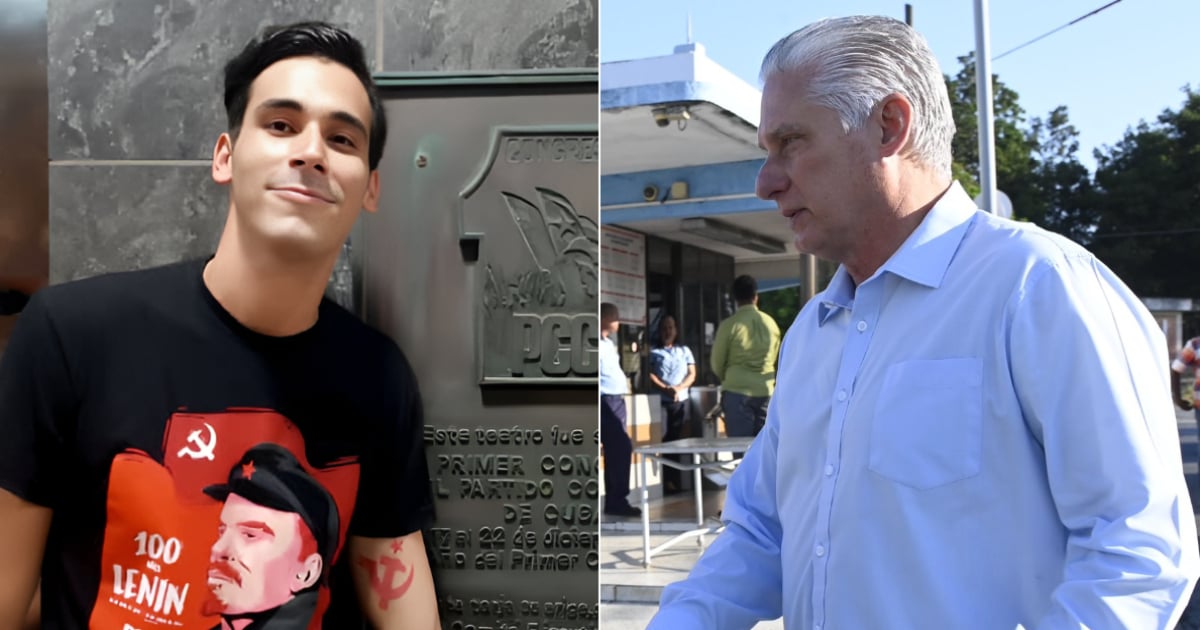Ricardo Rodríguez González, the national president of the University Student Federation (FEU), has publicly expressed his unwavering support for the Cuban regime's rationale behind the increase in ETECSA tariffs, aligning himself closely with the government's narrative. In a social media post following President Miguel Díaz-Canel's appearance on the podcast "From the Presidency," Rodríguez stated: “Clear explanations were given, mistakes were acknowledged, and the necessity of the measure was explained in light of the complex situation.”
These remarks have been perceived as an act of servility and betrayal towards the student body, especially amid a wave of university discontent that has led to statements, academic strikes, and a strong demand for Rodríguez González's resignation.
A Post Revealing Allegiances
In his post, Rodríguez, who is also a member of the Council of State, not only endorsed Díaz-Canel's explanations but also reiterated the supposed legitimacy of the dialogue process between students and authorities, claiming that “Cuban university students are heard” and will not be manipulated “by the enemies of the Revolution.” Additionally, he suggested the formation of a multidisciplinary group with students and ETECSA specialists to mitigate the impact of the tariff increase. However, he did not address the specific demands from students in various faculties, such as removing the monthly recharge limit or reversing measures affecting the general public.
Rodríguez’s response glosses over the true reasons for the protest: the rising costs of telecommunications services amid a severe economic crisis affecting all Cubans, especially young people, and a lack of transparency and prior consultation with university communities. His emphasis on delegitimizing dissent by attributing it to “enemies of the Revolution” positions him as a tool of the official discourse.
Student Rejection and Calls for Resignation
Students have not held back in their response. On June 4, the Faculty of Philosophy, History, Sociology, and Social Work at the University of Havana issued a direct statement demanding Rodríguez's immediate resignation due to his “passive and uncritical” stance and inability to represent the genuine interests of students on the Cuban Television’s Roundtable program. This institutional rejection adds to the widespread discontent on social media and within university spaces, where there is criticism of the lack of transparency in the approval process for new tariffs and the indifference of student representatives to grassroots demands.
During his podcast, Díaz-Canel blamed “paid media campaigns” for fueling student protests and popular outrage over the ETECSA price hike, asserting that there is a “political intention” behind the protests and student demands. Rather than calming the situation, his statement reinforced the perception that the regime systematically avoids responsibility and criminalizes any form of dissent, even when it arises from historically institutional-aligned spaces like universities.
More Spokesperson than Representative
The stance of the FEU president confirms the role this organization has played since the so-called “revolution” under Fidel Castro's authoritarian regime. Stripped of autonomy and politically subordinated, the FEU transformed from one of the most active civil society organizations in the Republic to a component of the totalitarian state apparatus built by Castro.
Instead of acting as a legitimate mediator, Rodríguez González has chosen to become a mouthpiece for the regime, echoing the same narratives historically used to suppress dissent. Rather than channeling student demands, his statement serves as an attempt to neutralize, shifting focus away from the real causes of discontent and reducing protests to mere incidents manipulated from abroad.
A Crisis of Representation
The FEU president's alignment with Díaz-Canel's narrative deepens the legitimacy crisis of this student organization. While young voices increasingly call for structural reforms and greater democratic participation, the leadership clings to outdated dogmas, fearing any expression of autonomy.
In a nation where youth are among the most affected by the economic crisis, the ETECSA price hike is merely the spark of a much deeper dissatisfaction. The FEU president's alignment with the regime not only constitutes a betrayal of his representative mandate but also illustrates the organization's absolute subordination to the state apparatus.
Understanding the ETECSA Tariff Increase Controversy
What prompted the increase in ETECSA tariffs?
The Cuban government justified the increase in ETECSA tariffs as a necessary measure due to the country's complex economic situation. However, this decision has faced criticism for not being transparent and for disproportionately affecting the population during a deep economic crisis.
How did students react to the tariff increase?
Students have reacted with protests, academic strikes, and demands for the resignation of FEU president Ricardo Rodríguez González. They criticize the lack of transparency in the tariff approval process and the disregard for their demands.
What role has the FEU played in this controversy?
The FEU, under the leadership of Ricardo Rodríguez González, has supported the government's narrative, leading to accusations of betrayal and servility towards the student body. The organization is seen as lacking autonomy and being politically subordinated to the regime.
